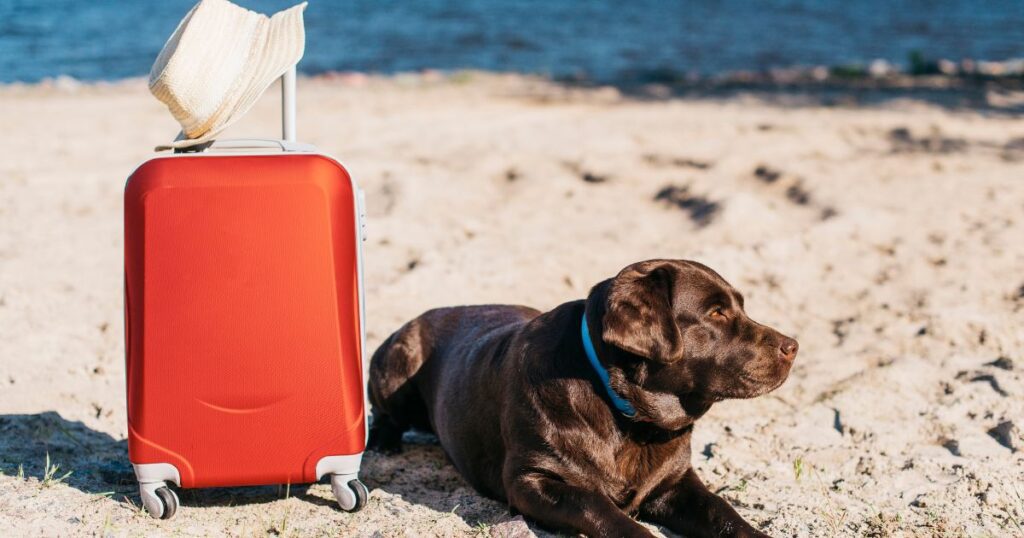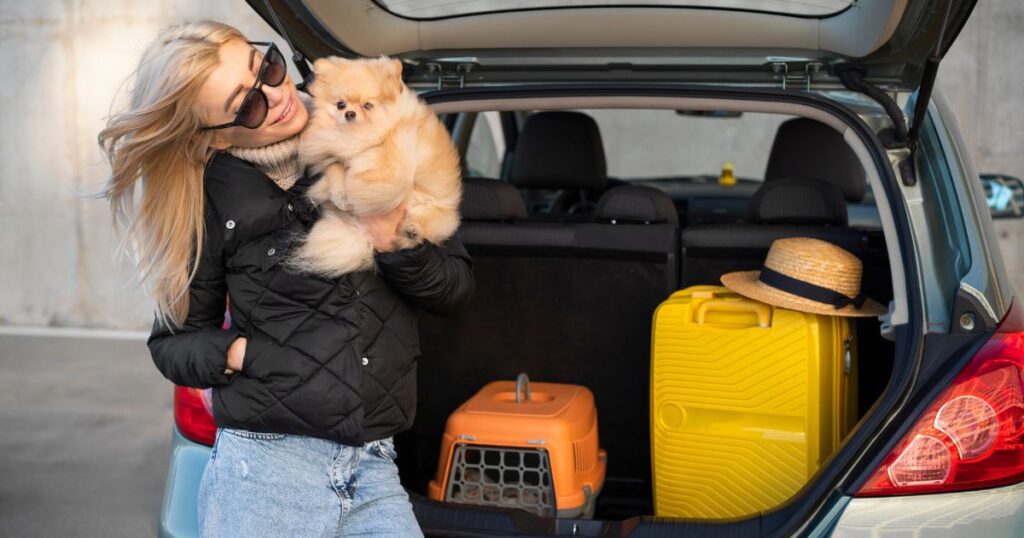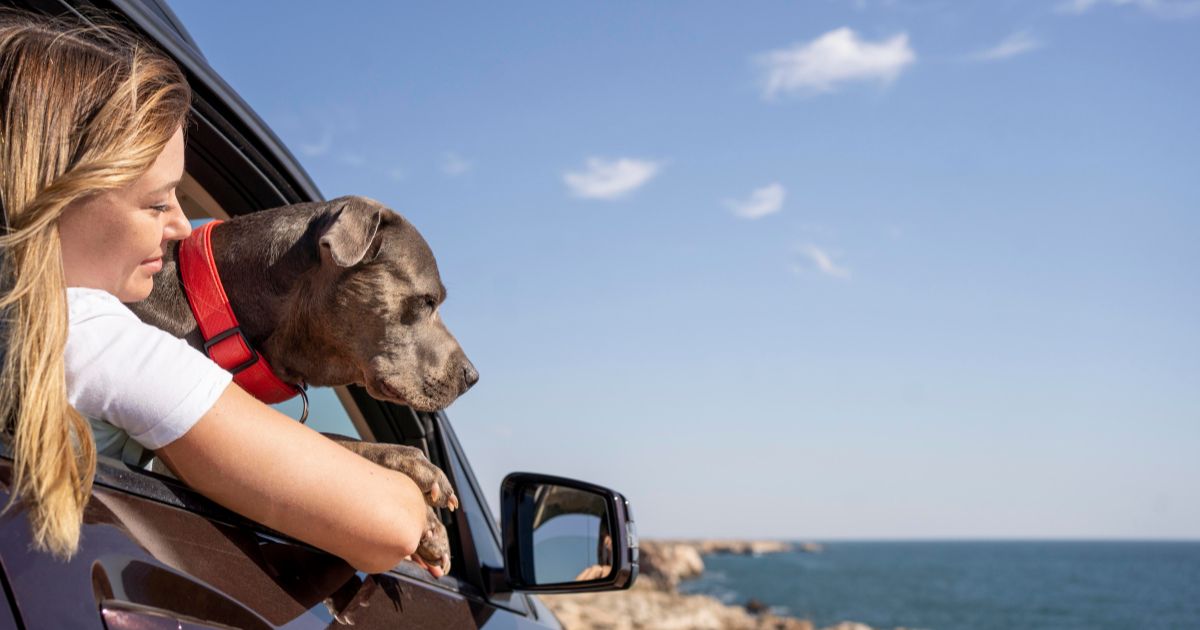Are you planning a vacation where you can travel to Costa Rica with dog? If so, you’re in for a treat! Costa Rica is not only known for its stunning landscapes and warm climate but also for being incredibly pet-friendly. This beautiful country offers countless opportunities for you and your furry friend to explore together. From sandy beaches to lush forests, Costa Rica has something to offer for every pet owner.
Traveling with your dog can sometimes feel overwhelming, but Costa Rica makes it easier for pet parents. With dog-friendly accommodations, restaurants, parks, and attractions, you can relax knowing your pup will have just as much fun as you will. Many restaurants, parks, and attractions allow dogs, allowing for shared experiences that enhance your trip. Plus, the abundance of outdoor activities means plenty of adventures await you both.
This guide will provide essential tips and information to ensure a smooth trip for you and your dog. You’ll learn about the necessary paperwork, health requirements, and what to pack for your pet. Additionally, we’ll explore some of the best pet-friendly activities and destinations in Costa Rica. Whether you’re staying for a short vacation or a longer adventure, this guide on how to travel to Costa Rica with dog will help make your journey enjoyable and stress-free.

Preparing for Your Trip: Pre-Travel Essentials
It is quite an exciting experience to travel with your dog to Costa Rica; however, it requires proper planning and necessary steps for hassle-free entry into the country. Costa Rica has relatively pet-friendly entry regulations, but unlike some countries that impose quarantine restrictions on entering the country, pets are allowed provided they have the proper paperwork and vaccinations, after which they can freely enter the country without being subjected to quarantine.
Here’s a guide to all the things you should know before taking your dog to Costa Rica, including necessary documents, vaccinations, airline restrictions, and vital safety tips to make travel smooth and easy.
Required Documents and Vaccinations
All dogs must meet Costa Rica’s pet importation requirements to enter the country. These regulations are designed to ensure animals are free of contagious diseases and in accordance with international health standards.
Veterinary Health Certificate
A veterinary health certificate is one of the most important documents required by a licensed veterinarian in your home country. This document assures that your dog is healthy and free from infectious diseases. In order to issue the health certificate, the veterinarian must meet all the following requirements:
- It must be issued within 14 days before travel
- It should be signed by a licensed veterinarian and endorsed by your country’s official animal health authority
- It must state that your pet has no clinical signs of infectious diseases and is fit for travel.
- The certificate should include details about your dog, such as breed, age, sex, and microchip number (if applicable)
Without this document, your pet may be denied entry into Costa Rica.
Proof of Rabies Vaccination
Rabies vaccination is one of the most critical requirements for dogs entering Costa Rica. The rules include:
- Your dog must be vaccinated against rabies at least 30 days before travel but no more than one year before entry.
- The rabies certificate must include the vaccine manufacturer, lot number, and expiration date.
- Puppies under three months old are exempt from rabies vaccination, but you may need additional paperwork to prove their age.
Other Required Vaccinations
In addition to rabies, Costa Rica requires dogs to be vaccinated against other common diseases. Your dog must be vaccinated for:
- Distemper
- Hepatitis
- Leptospirosis
- Parvovirus
These vaccinations protect against common canine illnesses and help prevent the spread of disease among local wildlife and pets.
Deworming and Parasite Treatment
Internal and external parasites have to be treated before traveling. Most airlines and Costa Rican authorities require proof that your dog has received treatment for tapeworms, fleas, and ticks within 15 days prior to arrival. This treatment prevents foreign parasites from entering the country.
Microchipping and Identification
While not legally required in Costa Rica, microchipping is highly recommended. A microchip ensures that if your dog runs away, you can identify them. In addition, your dog should wear a collar with an ID tag that includes:
- Your name and phone number
- Your temporary address in Costa Rica
- A rabies tag number (if applicable)
These extra precautions will help keep your pet safe in case they wander off.

Pet-Friendly Travel Insurance for Your Dog
When traveling with your pet, especially to a destination like Costa Rica, where regulations and environments can differ significantly from home, having pet travel insurance becomes essential. Here are a few key reasons why:
Health Coverage for Your Dog While Abroad
Traveling exposes your dog to new environments, which may present health risks such as exposure to unfamiliar diseases or parasites. Pet travel insurance can cover unexpected veterinary visits, whether for illness, injury, or an allergic reaction to new foods or plants. Knowing that you have financial support for your pet’s health can reduce the stress of navigating a foreign vet system.
Emergency Vet Visits
Accidents happen, and sometimes dogs get into trouble while exploring new surroundings. Pet travel insurance can cover the costs associated with emergency vet visits, which can be particularly high in tourist-heavy areas. This ensures that your furry friend can receive prompt care without you having to worry about the financial burden.
Cancellations
Life is unpredictable, and plans can change suddenly. If you need to cancel your trip due to unforeseen circumstances, pet travel insurance can help offset costs associated with non-refundable pet lodging, flights, or other travel expenses. This is especially important if you’ve made arrangements for your pet to travel with you.
Lost Luggage
Traveling with pets often means bringing along additional luggage such as food, supplies, and comfort items. If your luggage is lost or delayed, pet travel insurance can help cover the costs of replacing essential items for your dog, ensuring they remain comfortable during your travels.
Overall, pet travel insurance is a safeguard that helps you navigate the uncertainties of traveling with your dog. It guarantees you can focus on enjoying your trip without the added worry of what might happen if things don’t go as planned.

What to Bring to Travel to Costa Rica with Dog
Traveling to Costa Rica with your furry friend can be an exciting adventure. To ensure that your dog is comfortable, safe, and happy during the trip, it’s important to pack the right essentials. Here’s a list of must-have items that will help make your journey as smooth as possible for both you and your dog:
Leash, Collar, and Identification Tags
A sturdy leash and collar are essential for keeping your dog secure while exploring Costa Rica. Ensure your collar has an identification tag with your contact information in case your pet wanders off. This is crucial, as it can help reunite you with your dog more quickly.
Portable Water and Food Bowls, Travel Food, and Treats
Keeping your dog hydrated and fed during your travels is vital. A portable water bowl will allow you to easily give your dog water on the go, while a travel food bowl makes mealtime convenient. Don’t forget to pack enough of your dog’s usual food and some treats to reward them during the journey or to help them feel at home in a new place.
Dog-Friendly Sunscreen and Insect Repellent
Costa Rica’s sunny climate and rich biodiversity mean you’ll want to protect your dog from the sun and pesky bugs. Dog-friendly sunscreen can help prevent sunburn, especially in areas with little fur. Insect repellent formulated for dogs can help keep them safe from bites and potential diseases.
Carrier Recommendations for Air Travel
When traveling by plane, a comfortable and sturdy carrier is key. Choose one that meets the airline’s size requirements and allows your dog to stand, turn around, and lie down comfortably. A familiar carrier can help reduce anxiety and make your dog feel secure during the flight.
Comfort Items (Dog Blanket, Toys, Familiar Smells)
Bringing along your dog’s favorite blanket or toys can provide comfort and reassurance in a new environment. Familiar scents, such as their favorite blanket or toy, can help ease anxiety and make your pet feel at home, whether you’re in transit or settling into your accommodation in Costa Rica.
Medications or Supplements Your Dog May Need
If your dog requires any medications or supplements, make sure to pack them for the journey. Having these on hand will ensure your dog stays healthy and comfortable during your travels. It’s also wise to have a copy of your vet’s contact information and any relevant health records.
By packing the essential items, you can help ensure a smooth and enjoyable trip for both you and your dog. Taking the time to prepare will not only make your journey easier but will also let you focus on making wonderful memories together in beautiful Costa Rica.
Arrival in Costa Rica: What to Expect
Costa Rica has two major international airports that accommodate pet arrivals:
Juan Santamaría International Airport (SJO) – San José
- The largest and busiest airport in Costa Rica.
- Situated near San José, this airport is accessible for tourists going to central and southern Costa Rica.
- It has a pet relief area outside the terminal where dogs can stretch and relieve themselves.
- Well-staffed customs agents are familiar with pet import requirements.
This airport is ideal if you’re traveling to areas like Jaco, Manuel Antonio, Dominical, or the Osa Peninsula.
Daniel Oduber Quirós International Airport (LIR) – Liberia
- Located in Guanacaste, in the northwestern region of Costa Rica.
- Less crowded than SJO, so it is a quieter option for pets.
- The airport also has a pet relief area outside the terminal.
- Nearest to beach towns like Tamarindo, Nosara, Playa Flamingo, and Santa Teresa.
- Some airlines offer direct flights here, which can reduce the travel time of pets.
This airport is ideal if you plan to explore the Nicoya Peninsula or Guanacaste’s beaches.

What to Expect During Customs Inspection
Once you reach Costa Rica with your dog, the first step before entering the country is going through customs and immigration. It’s a relatively smooth process if all the paperwork is prepared and you know the pet import requirements of Costa Rica. Custom officials will inspect the health certificate and vaccination record for your dog along with checking your dog’s health condition to satisfy the entry requirement of Costa Rica.
Understanding what happens during this inspection might save you considerable stress and the potential for entry delays. See below for a list of required documents, pet health inspection, expected issues, and how to streamline the process.
Presenting Required Documents
Upon arrival, customs officials will ask for your dog’s import paperwork, which must be complete and up to date. The essential documents include:
- Veterinary Health Certificate: This shall be issued within 14 days of travel from a licensed veterinarian. It confirms that your dog is free from contagious diseases.
- Rabies Vaccination Record: Your dog should be more than 30 days since his or her most recent rabies shot but no more than a year old. Rabies exemptions apply to puppies under the age of three months.
- Deworming and Parasite Control Records: Proof of internal and external parasite treatment is required when traveling to Costa Rica, not more than fourteen days before departure.
It’s advisable to bring multiple copies of these documents in case the customs officials request duplicates. Some travelers also find it helpful to keep digital copies of these documents on their phone or email for immediate access.
Pet Health Inspection
In addition to reviewing your paperwork, customs officials will visually inspect your dog to confirm that they appear healthy and free of disease. They typically check for:
- Signs of illness or distress (such as excessive panting, coughing, or lethargy).
- Visible parasites like ticks or fleas.
- Open wounds or injuries that could indicate a potential health issue.
Most dogs pass the inspection without problems, especially if they are active, alert, and appear to be well cared for. If customs officials are concerned about the condition of your pet, however, they may require a further veterinary examination before allowing entry.
Potential Issues and Delays
If your dog’s paperwork is incomplete or incorrect, customs may not allow them to enter Costa Rica immediately. The most common issues include:
- Missing or expired rabies vaccination records.
- Veterinary health certificate issued too far in advance (must be within 14 days of travel).
- No proof of parasite treatment before departure.
In some cases, minor paperwork issues in the airport can be addressed by the passengers, like reaching your veterinarian to acquire some missing documents. However, if the discrepancies are major, your pet will either be quarantined or sent back to your departure country at your expense.
For this reason, double-check all documents well before your travel date to ensure everything meets Costa Rican regulations.

Tips for a Smooth Arrival with Your Dog
Bringing your dog along to Costa Rica is an adventurous experience, and if you aren’t prepared, then the experience is overwhelming at a time when things get complicated, especially at the arrival airport or even border crossing. A smooth landing requires a healthy mix of thorough planning, some patience, and organization to keep the transition relatively stress-free both for you and your pet.
From customs and immigration to keeping your dog calm after their big move, these essential tips will guide your seamless arrival to Costa Rica.
Keep All Pet Documents Easily Accessible
When you land in Costa Rica, customs officials will expect to inspect your dog’s veterinary health certificate, proof of rabies vaccination, and records of parasite treatment. Having these documents on hand will avoid delays in processing.
- Store all paper copies in a folder for easy and quick access.
- Keep digital copies on your phone or email in case you need backups.
- Bring multiple copies in case officials request duplicates.
If your paperwork is organized and correct, you’ll pass through customs quickly and avoid unnecessary delays.
Plan for Possible Wait Times at Customs
Even if your dog’s paperwork is in order, you may still encounter wait times at customs, particularly during peak travel hours. Inspection can take up to 30 minutes or even more than an hour, depending on the number of passengers arriving and how busy officials are.
To keep your dog comfortable while waiting:
- Offer water to prevent dehydration after the flight.
- Have a travel leash ready in case you need to take your dog out of their carrier.
- Bring a small towel or cooling mat to keep your pet comfortable in warm temperatures.
A little preparation will make the waiting period easier for both you and your furry friend.
Choose a Pet-Friendly Rental Car
If you plan to drive in Costa Rica, book a pet-friendly rental car in advance. Some car rental companies allow pets, but policies vary, so confirm ahead of time.
To make the ride comfortable for your dog:
- Bring a seat cover or travel blanket to protect the seats.
- Use a pet seatbelt or secured crate for safety.
- Stop for bathroom and water breaks if traveling long distances.
Renting a car is the most convenient way to explore Costa Rica with your dog, allowing you to visit beaches, national parks, and scenic towns at your own pace.
Find a Nearby Pet Relief Area
Your dog will likely need to stretch and relieve themselves after the long flight, so check if airports in Costa Rica have designated pet relief areas. If not, there may be quiet green spaces outside the terminals.
When taking your dog out:
- Keep them on a leash to ensure their safety.
- Bring waste bags to clean up after them.
- Let them walk and relax before starting your next journey.
Giving your dog a chance to move around will help them adjust after the flight and reduce travel anxiety.
Stay Hydrated and Feed Your Dog Lightly
Traveling can be dehydrating for both humans and animals. Ensure your dog has fresh water immediately upon arrival. A collapsible dog bowl is portable and handy for quick breaks to hydrate your dog.
Avoid feeding your dog a big feast right after landing, especially if the travel stress or motion sickness could upset its stomach. Just give it a little portion and wait until it has settled, and you will be able to receive an adequate meal.
Prepare for the Climate
Costa Rica’s warm and tropical climate can be overwhelming for dogs used to cooler climates. Take precautions upon arrival in hot and humid areas to prevent overheating.
- Avoid direct sun exposure during the hottest hours of the day.
- Provide shade and water when stopping outdoors.
- Use a cooling vest or mat if your dog is prone to overheating.
If you’re traveling to higher altitudes or mountainous regions, be aware that temperatures can drop significantly, so pack a light dog sweater if needed.
Book Pet-Friendly Accommodation in Advance
Before arriving, confirm whether your accommodation (hotel, rental home, or lodge) welcomes animals. Some places have size limitations or additional fees for pets, so review the policies ahead of time to avoid surprises.
When booking, look for:
- Rooms with outdoor access for easy potty breaks.
- Nearby walking areas where your dog can get exercise.
- Noisy-free zones if your dog is sensitive to sounds.
A comfortable and pet-friendly stay will make the trip enjoyable for both you and your dog.

Costa Rica’s Pet Regulations: What You Need to Know
Understanding Costa Rica’s pet regulations not only ensures compliance but also promotes the safety and well-being of your pet. Below, we outline the key aspects of these regulations, including leash laws, general safety guidelines, and rules regarding pets in public places.
Leash Laws
Costa Rica has specific laws regarding the control of pets in public areas. Here are the key points to consider:
- Leashing Requirements: In most urban and populated areas, dogs must be on a leash when in public spaces. This is to ensure both the safety of your pet and that of other people and animals.
- Retractable Leashes: While retractable leashes are permitted, they should be used with caution. Ensure that your dog is well-trained to stay close, as these leashes can sometimes lead to accidents if not controlled properly.
- Designated Dog Parks: Some areas in Costa Rica have designated dog parks where pets can roam freely. These parks provide a safe environment for dogs to socialize and exercise while under the supervision of their owners.
General Safety Guidelines
When bringing your pet to Costa Rica, consider the following safety guidelines to ensure a smooth and enjoyable experience:
- Hydration: Costa Rica has a warm climate, so make sure your pet has access to fresh water at all times, especially during outdoor activities.
- Sun Protection: Pets can be susceptible to sunburn, particularly those with light-colored fur or exposed skin. Consider using pet-safe sunscreen or providing shaded areas during hot weather.
- Identification: Ensure your pet is microchipped and wears a collar with identification tags. This is crucial in case your pet gets lost. Having a microchip will also help link your pet to the necessary documentation when traveling internationally.
- Traveling Safely: Use a pet carrier that complies with airline regulations and ensures your pet is secure while traveling in vehicles. Familiarize your pet with the carrier before the trip to reduce anxiety.
Pets in Public Places
Costa Rica is generally pet-friendly, but there are regulations and etiquette to observe when it comes to bringing pets into public spaces:
- Parks and Beaches: Many parks and beaches welcome pets as long as owners clean up after them and keep them on a leash. Some places may have specific hours for pet access, so it’s advisable to check local regulations beforehand.
- Restaurants and Cafes: Policies regarding pets vary by establishment. Some outdoor dining areas may allow pets, while indoor spaces typically do not. Always ask the management before entering a premises with your pet.
- Transportation: If you are using public transportation, check with the specific carrier for their pet policy. Buses and shuttles may have different rules regarding pet travel.
Navigating pet regulations in Costa Rica requires preparation and awareness. By adhering to leash laws, following safety guidelines, and understanding the rules concerning pets in public places, you can ensure a safe and enjoyable experience for both you and your furry companion.
Exploring Costa Rica with Your Dog: Top Pet-Friendly Activities
Traveling to Costa Rica with your furry friend can be a delightful experience, thanks to the country’s abundance of pet-friendly activities and stunning natural landscapes. Whether you’re hiking through lush rainforests, lounging on sandy beaches, or exploring vibrant local towns, there are numerous opportunities for you and your dog to bond and enjoy the beauty of Costa Rica together. Here are some of the top pet-friendly activities you can enjoy:
Dog-Friendly Beaches
Costa Rica is renowned for its pristine beaches, many of which welcome dogs. Here are some of the best dog-friendly beaches:
- Playa Guiones: Located in Nosara, this beach is not only famous for its surf but also for its wide-open spaces where dogs can run freely. The laid-back vibe and stunning sunsets make it an ideal spot for a day out with your pet.
- Playa Tamarindo: A popular destination for both tourists and locals, Tamarindo Beach offers ample space for your dog to play in the sand or splash in the waves. Many beachfront bars and restaurants are dog-friendly, allowing you to relax while your pup enjoys the ocean.
- Playa Hermosa: This beautiful beach in Guanacaste is perfect for dogs, with its soft sands and gentle waves. It’s less crowded than other beaches, making it an excellent spot for a peaceful outing.
National Parks and Nature Reserves
Costa Rica’s remarkable biodiversity is best experienced in its national parks. Many of these parks allow dogs on leashes, offering a wonderful opportunity for you and your furry friend to explore together.
- Rincón de la Vieja National Park: Known for its volcanic landscapes, this park features various hiking trails that range from easy to challenging. Dogs are welcome on leashes, so bring plenty of water and enjoy the diverse flora and fauna along the way.
- Santa Rosa National Park: This park combines beautiful beaches with dense forests. Take your dog on the trails, where you can spot wildlife and enjoy breathtaking views of the Pacific Ocean.
- Braulio Carrillo National Park: Located near San José, this park boasts lush rainforests and numerous hiking trails. While dogs are allowed on leashes, be sure to check specific regulations for each trail before heading out.
Scenic Trails and Parks
In addition to national parks, Costa Rica has many scenic trails and parks perfect for walking your dog:
- Hacienda Pinilla: This private community offers miles of walking trails, beaches, and parks that are dog-friendly. Enjoy long walks alongside your pet while taking in the beautiful coastal views.
- Cerro Chirripó: If you’re up for a challenge, consider hiking to the highest peak in Costa Rica. While dogs are not allowed on the summit trail, the surrounding areas offer beautiful viewpoints and trails where dogs are welcome.
- La Fortuna Waterfall: Located near Arenal Volcano, the trail to the waterfall is pet-friendly, with perfect spots for you and your dog to take a dip in the cool waters. Remember to keep your dog on a leash and clean up after them as you enjoy the beautiful scenery.
Traveling to Costa Rica with your dog opens up a world of adventure and fun. With its stunning beaches, lush national parks, scenic trails, and welcoming restaurants, you and your furry companion will create unforgettable memories together. Just remember to plan ahead, keep your dog’s needs in mind, and enjoy exploring the beautiful landscapes Costa Rica has to offer.
Renting a Car in Costa Rica with a Dog
A rental car gives you more freedom, flexibility, and comfort while traveling with your furry friend. However, it requires some preparation to ensure a smooth and enjoyable journey for both you and your dog.
Here’s everything you need to know about renting a car in Costa Rica with a dog.
Choosing a Pet-Friendly Car Rental Company
Not all car rental companies in Costa Rica allow pets, so confirmation of their pet policy is imperative before making any reservation. Others are pet-friendly but have their rules on size, breed, and cleanliness; others charge a cleaning fee due to pet hair or dirt.
To find the right rental:
- Call ahead to inquire about pet policies.
- Look for companies that welcome dogs with no extra fees.
- Consider renting an SUV or a larger vehicle for extra space and comfort.
Booking in advance ensures you secure a car that meets both your needs and your dog’s comfort for the journey ahead.
Preparing Your Rental Car for Your Dog
Once you’ve collected your rental car, there are some extra steps to take to make it dog-friendly. Dogs shed, drool, and track in the dirt; thus, by protecting the interior, you might avoid cleaning fees or damage charges.
- Use a seat cover or blanket to protect upholstery from fur and scratches.
- Bring a portable pet bed or cushion for added comfort.
- Carry a small towel or wipes to clean paws after outdoor adventures.
- Keep your dog secured with a pet seatbelt, harness, or travel crate for safety.
Setting up a comfortable space for your dog ensures a stress-free and clean ride.
Keeping Your Dog Safe While Driving
The roads are quite winding, and unexpected potholes appear—there are also changes in weather. So, it’s a must to keep your dog safe and calm while driving in Costa Rica.
- Never let your dog sit in the front seat to avoid potential injury from airbags during accidents.
- Avoid letting your dog put their head out the window, as dust or sudden stops can cause injury.
- Take regular breaks to allow the dog to stretch, hydrate, and pee.
- If your dog tends to be anxious in the car, bring along some familiar toys or calming treats to keep them relaxed.
A safe and comfortable dog makes for a much more enjoyable road trip.
Best Vehicles for Traveling with a Dog
The type of vehicle you rent will determine how comfortable the trip will be for your dog. Although smaller cars are budget-friendly, they may not be spacious enough for you, your luggage, and your pet.
Consider renting:
- SUVs or Crossovers: These provide extra room and better handling on rough roads.
- 4×4 Vehicles: Ideal if you plan to visit remote beaches, national parks, or mountainous areas.
- Station Wagons or Minivans: Great for multiple passengers and larger dogs.
Choosing the right vehicle ensures your dog has enough space to rest comfortably during long drives.
Essential Travel Tips for Driving in Costa Rica with a Dog
Driving through Costa Rica with your dog is an incredible way to experience the country, but it requires some preparation to ensure safety and comfort for both you and your furry companion. Here are some essential tips for a smooth and safe driving experience.
- Know Local Driving Laws: Always carry a rental agreement, driver’s license, and insurance as proof when driving. Costa Rica doesn’t have specific laws regarding pets in cars, but some areas may require pet restraints. It’s always best to check local regulations, especially if traveling on rural roads.
- Choose the Right Vehicle: A 4×4 or SUV is ideal for rugged terrain and remote destinations, and ensure your rental vehicle allows pets. When selecting a vehicle, consider one that provides enough space for your dog to sit comfortably during long drives. Large vehicles offer more space for your dog and luggage, which is crucial for a stress-free trip.
- Secure Your Dog Properly: Use a pet seatbelt, crate, or car hammock to ensure your dog’s safety and prevent distractions. Avoid letting your dog roam inside the vehicle while driving, as this can be dangerous for both of you.
- Take Frequent Breaks: For your dog’s comfort, stop every 1.5 to 2 hours to let them stretch, drink water, and relieve themselves. Identify pet-friendly rest stops or establishments along your route where you can take breaks.
- Never Leave Your Dog in the Car Alone: Temperatures in Costa Rica can rise rapidly, even in the shade. Never leave your dog in the car unattended. Always bring your dog with you, or if you must leave them for a short time, ensure the car is well-ventilated.
- Check Weather & Road Conditions: Be aware of weather and road conditions. Heavy rains can make unpaved roads quite slippery, and rural areas might be more slippery than urban centers. Check your weather forecast and avoid unpaved roads during the rainy season.
- Be Cautious of Wildlife on the Road: Some places in Costa Rica have free-ranging monkeys, sloths, and iguanas. All these may roam into the streets anytime. While traveling in high areas with increased wildlife, do not drive aggressively.
- Have Emergency Contacts Ready: Save important emergency numbers before your trip. These should include your rental company, roadside assistance, and a local veterinarian. Having these contacts handy will help you handle any unexpected situations that may arise.
Frequently Asked Questions
In this guide, we’ll cover some of the most frequently asked questions about how to travel to Costa Rica with a dog. Whether you’re seeking adventure or simply want to relax, this FAQ section will ensure a seamless experience when you travel to Costa Rica with your dog. Explore below:
How long before my trip should I start the process of bringing my dog to Costa Rica?
It’s advisable to begin the process of bringing your dog to Costa Rica at least 2-3 months before your trip. This gives ample time to gather necessary documentation, including a pet health certificate and vaccination records, as well as to address any potential issues that may arise. Ensuring everything is prepared well in advance will help reduce stress as your departure date approaches.
Does Costa Rica require a rabies titer test for dogs entering the country?
No, Costa Rica does not require a rabies titer test for dogs entering the country. However, a valid rabies vaccination certificate is necessary, indicating that your dog is up to date on this vaccination. It’s best to verify the latest entry requirements before your trip, as regulations can change.
Are there any specific breeds that are restricted or banned from entering Costa Rica?
Yes, Costa Rica has restrictions on certain dog breeds considered dangerous, such as Pit Bulls, Rottweilers, and others. These breeds may require additional documentation or face entry restrictions. Always verify the latest breed-specific regulations before traveling.
Is it required to have a microchip implanted in my dog for entry into Costa Rica?
No, microchipping is not a mandatory requirement for dogs entering Costa Rica. However, having a microchip can be beneficial for identification purposes, especially in case of loss or separation during your travels. It’s a good idea to have your dog microchipped as a precaution.
Should I choose to fly my dog in the cabin or as cargo for a trip to Costa Rica?
Choosing whether to fly your dog in the cabin or as cargo depends on your dog’s size and temperament. Smaller dogs typically can travel in the cabin with you, while larger breeds may need to fly as cargo. Consider your dog’s comfort and your own preferences when making this decision.
Can I bring my dog’s food or should I buy it once I arrive in Costa Rica?
You can bring your dog’s food with you, but be sure to check airline regulations for pet food transportation, as certain food types may be restricted. Some travelers choose to buy food locally to avoid potential issues at customs, but always bring enough for your dog’s needs during the trip, especially if your dog has specific dietary needs.
What should I do if my dog experiences anxiety or stress during travel to Costa Rica?
If your dog is prone to anxiety or stress during travel, consider consulting your veterinarian for advice on calming medications or natural remedies. Bringing familiar items, such as a favorite blanket or toy, can also help ease your dog’s anxiety. Planning for regular breaks during travel can provide your dog with opportunities to relieve stress.
Is it safe to travel to Costa Rica with a dog?
Traveling to Costa Rica with a senior dog can be safe, but it requires careful planning and consideration of your dog’s health. It’s essential to consult your veterinarian to ensure your dog is fit for travel and to discuss any necessary accommodations. Keeping an eye on your dog’s comfort and health during the trip is crucial.
How do I make sure my dog is comfortable during long flights to Costa Rica?
To ensure your dog is comfortable during long flights to Costa Rica, provide a cozy crate or carrier that allows them to stand, turn around, and lie down comfortably. Familiar items like blankets or toys can help ease anxiety. Additionally, making sure your dog is well-exercised before the flight and stays hydrated can contribute to a more pleasant journey.
Should I rent a car for my trip to Costa Rica with my dog?
Renting a car is a convenient option for traveling in Costa Rica with your dog, as it provides flexibility and the ability to explore at your own pace. Ensure that the rental vehicle is pet-friendly and safe for your dog. Having a car allows for easier access to various outdoor activities and dog-friendly locations.
What kind of pet health insurance is available in Costa Rica, and should I get it for my dog?
Pet health insurance in Costa Rica is available but varies by provider. It’s a good idea to research and compare plans to ensure your dog’s health needs are covered while you’re traveling. Having insurance can offer peace of mind in case of unexpected medical issues.
Can I take my dog to national parks or protected wildlife areas in Costa Rica?
In general, dogs are not allowed in national parks or protected wildlife areas in Costa Rica. This policy helps protect native wildlife and maintain the natural environment. Make sure to check specific regulations for each location you plan to visit to avoid any issues.
Can I take my dog back with me after visiting Costa Rica, and are there any special re-entry requirements for pets when leaving Costa Rica?
Yes, you can take your dog back with you after visiting Costa Rica. However, re-entry requirements will depend on your home country. Be sure to check the pet importation regulations of your destination, including any necessary health certificates or other documentation.
Final Thoughts
Traveling to Costa Rica with your dog promises to be an unforgettable adventure. From exploring lush landscapes and pristine beaches to experiencing vibrant wildlife, the memories you make with your furry companion will last a lifetime. However, like any international trip, preparation is key to ensuring a smooth and enjoyable journey.
Before you set off, take the time to ensure your pet is fully prepared for the trip. Having all the necessary documents in order may seem like a lot, but it’s crucial for both your peace of mind and your dog’s comfort. Plan your itinerary around pet-friendly activities and accommodations to ensure that both you and your dog can enjoy every moment together. Whether you’re lounging on the beach or hiking through the mountains, Costa Rica offers endless opportunities for both of you to explore.
If you’re looking for a rental car to help you get around, Budget Costa Rica is here to make your travel experience even easier. We offer a range of vehicles that cater to all your needs, giving you the flexibility to explore at your own pace. Start planning your Costa Rican adventure today, and create unforgettable memories with your four-legged friend. Book your rental car today.





